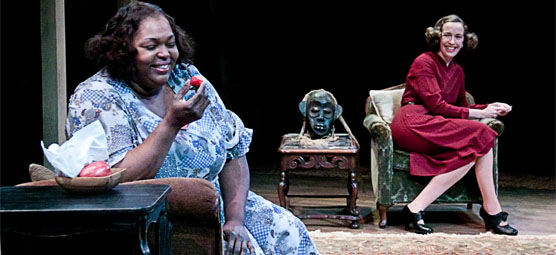In a Texas prison in 1935, a white researcher wants to record early American songs from a black prisoner. Susannah Mullally, played with determined clarity by Diana Sheehan, collects folk music for the Library of Congress — the earlier the better. She’s been exiled to the American equivalent of Siberia, Texas, for making noise about her superior claiming credit for some of her work. Her chance to regain her reputation and a coveted job at Harvard is to find a song that came over on a slave ship from Africa. Alberta “Pearl” Johnson seems to hold the key. She has a deep catalogue of songs stored in her memory and a great voice to boot, provided by the similarly endowed Liz Mikel. Unfortunately for Susannah, Pearl is a shrewd customer who has needs of her own. She’s lost touch with her daughter and will do anything to find her.
On the face of it, this seems like a fantastic scenario ripe with dramatic potential with great historical legs to boot. And, author Frank Higgins knows how to twist the plot knife at just the right time. These are the things you get. What you give up is dialogue. It has the blunt edge of exposition. If you are hoping to eavesdrop on the complicated cat and mouse bargaining inherent in the plot summary you will be disappointed. The banter of the play lacks feminine finesse. Even Meisner master Martin can’t overcome the clunk. So, you’ve got richly drawn characters replete with detail but they don’t interact well. In fact, Susannah at one point even says, “We do better when we’re singing.” She’s right.
What you do get is Liz Mikel singing spirituals a cappella. For many that would be enough to excuse all ills. Add to that her character as a strong, wronged woman of woe and you’ve got an evening of entertainment right there. Actress Diana Sheehan adds variety to the musical mix at first with an old folk tune in full librarian’s voice. Later, she adds color and feeling to her rendition of an Irish lament and suddenly an audience who may have come for Black Pearl are enjoying an unexpected bonus. Under the sure handed musical direction of Akin Babatunde, the singing ends up the star of the show.
At the climax of the play, Pearl must decide how far she’ll go in helping this woman whom she’s only lately come to know. Should she go all the way in an effort to acknowledge and repay all the help this friend has given her, or should she hold back in order to protect and provide for her family? It’s not an easy choice. It all depends on what you value more, friends or family. The could be said for seeing this show. It all depends on what you value more, speaking or singing.
Photo: Liz Mikel and Diana Sheehan (Photo by Mark Oristan for Water Tower Theatre)






